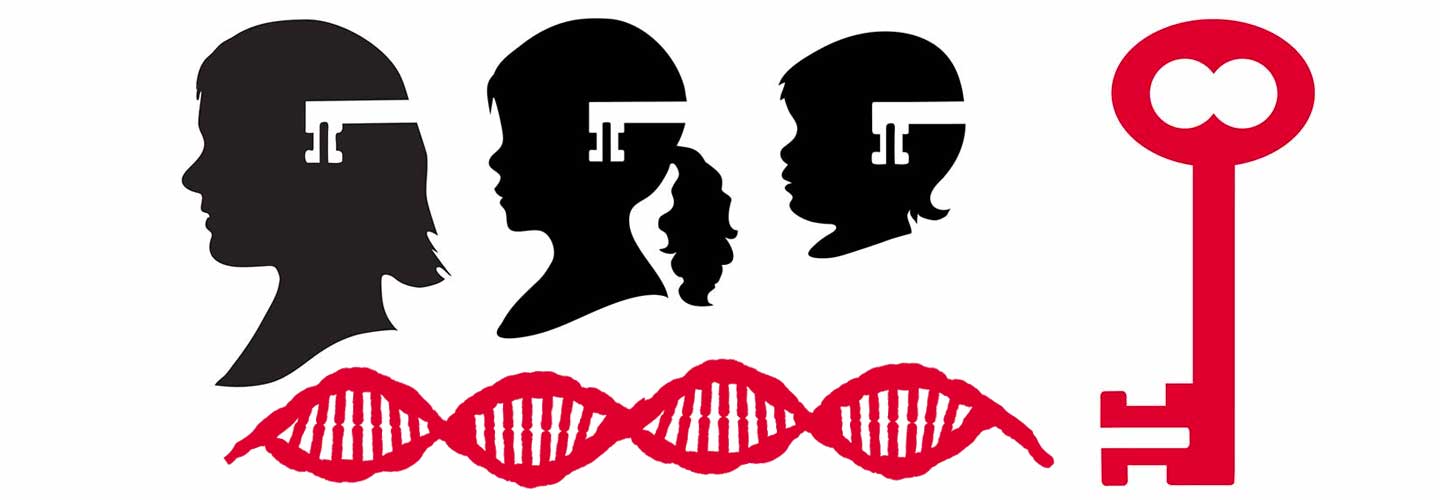Your Ultimate Mental Health Gene Chart
- Home
- Blog

DNA+Environment+Triggers+Chance = Happiness or Emotional Pain
Find the Key to Unlocking Your Personal Genome, to Feel Happier and Improve Cognition– Bruce Alan Kehr, M.D.
Reader, you asked and I answered. Over the past 8 months a number of you contacted me from afar, as far away as Asia and the Middle East, or our own West Coast, seeking answers as to why your “depression,” “bipolar disorder,” and “anxiety” have not gotten better through standard psychiatric treatments. Some of you wept tears of joy when we analyzed your DNA, unlocked the answers residing in your personal genome, and determined the key to what was missing to guide our treatment. Your relief was amplified even more when we implemented interventions based upon your test results, and you began to feel better. In the intervening months, many of you have contacted me and stated how useful my DNA series have been in aiding your understanding of genes, epigenetics, and mental health and wellness. With that in mind, I’ve decided to pause our Second Opinion series to bring you a useful all-in-one chart to explain the function of each gene named in my “DNA: I Am Who I Am… or Am I?” series, and how you can modify the expression of these genes (turn them on or off or bypass them) to impact these genes for the better. Jump right in and improve your emotional health and cognitive functioning by discussing these epigenetic modifiers with your doctor!*
BDNF
The “Brain Fertilizer” Gene
Your BDNF gene manufactures BDNF protein that promotes both survival and growth of your brain cells and the synapses that connect them. It promotes healthy cognitive functioning, produces important neurotransmitters in charge of mood regulation and other key functions, and improves executive functioning. The higher your levels of BDNF, the higher your brain’s potential and creativity. If you have a variant on this gene that leads to a low level of BDNF expression, you are not operating at your brain’s highest potential—but lifestyle modifications have been shown to have an important impact on increasing BDNF expression. Learn more about your BDNF gene and “fertilize” your brain.
Possible Gene Modifications
- L-Theanine (component of Green Tea)
- Phosphatidyl Serine
- Exercise
- Omega 3
- Lithium
MTHFR
The Serotonin, Dopamine and Norepinephrine Manufacturing Gene
The MTHFR gene is in charge of the production of the MTHFR enzyme, which transforms folate—a crucial building block of your body—into a new form (known as methylfolate) your body can put to use. Methylfolate is used to make brain chemicals essential for a number of aspects of our mental health—including the neurotransmitters serotonin, dopamine, and norepinephrine. Without enough methylfolate, these neurotransmitter levels decrease, leading to—among other things—depression and anxiety. If you understand the variants on your methylfolate gene, you can better target the mood disorders you may suffer through both medication and supplements.
Possible Gene Modifications
- Deplin
- Enlyte
- OTC L-Methylfolate
SLC6A4
The Serotonin Pump Gene
Your SLC6A4 gene has a simple mission: it encodes the serotonin transmitter protein, which is responsible for transporting serotonin to where it needs to be, and to recycle it so it can be used again and again. Serotonin is a crucial neurotransmitter in your body—it regulates everything from mood and anxiety to sleep and appetite. If you have a variation on your SLC6A4 gene, your body may be less equipped than others at transporting serotonin. If you have low serotonin you are more likely to suffer from depression and anxiety. Understanding the variants on this gene can help you and your doctor find the right type of medication to help you feel better sooner.
Gene Variants Predict:
- Likelihood of positive response to SSRIs
- Higher likelihood of side effects and/or lack of effectiveness
ANK3 and CACNA1C
The “Mood Swing” Genes
The ANK3 gene and the CACNA1C gene play a role in emotional stability and mood regulation in your daily life. ANK3 is responsible for the maintenance of your sodium ion channels and CACNA1C is responsible for your calcium ion channels. Both of these ion channels determine the rate and pace of high-emotion “messages” being communicated at the cellular level. If you have a genetic variation on your ANK3 gene, you may find yourself unable to return to a “normal” state after a high-emotion situation—like watching a movie or experiencing a breakup. That’s because your cells’ “action potential firing”, responsible for transmitting messages, are misfiring and leading you to mood instability. If you have a genetic variation on your CACNA1C gene, you may be unable to effectively control messages being communicated from certain cells in your brain. This leads to “excitatory signaling”—in other words, mood swings and anxiety. Understanding the variants on your ANK3 and CACNA1C genes can better equip you to manage your “emotional roller coaster ride” in a way that’s suited to you and your body.
Sodium channel blockers:
- Lamictal
- Lithium
- Carbamazepine
- Omega 3
- Prozac
- Topiramate
- Red Grape Polyphenols
Calcium channel blockers:
- Magnesium
- Nimodipine
- Topiramate
- Lithium
- Lamictal
- Memantine
- Carbamazepine
- Red Grape Polyphenols
OPRM1
The “Addiction Gene”
(the “Addiction Gene”)
Variations on the OPRM1 gene can determine the way your body reacts to pleasure and cope with pain—and can also put you at greater risk of addiction to opioid drugs. OPRM1 encodes a very important protein known as the “Mu Opioid Receptor” that is responsible for receiving and interpreting chemical messages from both naturally occurring opioids within your body and “outside” opioids you may be prescribed. Those opioids in turn allow you to feel pleasure and relief from pain. If you have a particular variant on your OPRM1 gene, you may have fewer opioid receptors and therefore need higher levels of opioids to feel relief from physical pain. This may put you at greater risk for addiction—not just to opioid medication, but to other substances as well. By taking a genetic test, you give yourself a head start on understanding your propensity for response to opioids and addiction
Possible Gene Modifications
- G allele greater risk for addiction as need higher opioid doses to achieve same level of pain relief, also higher rates of nicotine and alcohol addiction
- Buprenorphine
- Naltrexone
COMT
The “Stress Response Gene”
The COMT gene produces an enzyme that determines whether you are a “worrier” or a “warrior” when it comes to novel stress situations. If your gene has a variation that produces more of the COMT enzyme, you’re naturally equipped to perform well in high-stress situations—however, your executive function in normal circumstances is not quite as good. If your gene has a variation that produces less of the enzyme, you don’t navigate novel stress as easily—but you have superior executive functioning abilities when not under stress. Understanding this gene allows you to take a more precise approach to stressful situations and manage them more effectively. For example, if you have a Met/Met variant, under conditions of novel stress, it helps if you practice extensively to develop a feeling of mastery.
COMT VAL/VAL – COMT inhibitors to increase dopamine
- Zinc
- L-carnitine
- Phosphatidyl Serine
- Green Tea
- L-Theanine.
COMT MET/MET – to decrease dopamine flooding and stabilize COMT:
- SAMe
- Magnesium
- Folic acid
- NAC
- Ashwagandha
- Vitamin D
- Meditation
DRD2
The Dopamine Receptor Gene
The dopamine receptor DRD2, functions to regulate synthesis, storage and release of dopamine. Mutations in the DRD2 gene can inhibit dopamine production and activity, leading to psychiatric and psychotic effects as well as an increased risk for addiction and neuropsychiatric diseases. All current antipsychotic prescription drugs target the DRD2 receptor, and variants in this receptor can predict a poor response or side effects from some of these medications. Dopamine is a “pleasure chemical”—in normal levels it brings us joy and euphoria. But there can be too much of a good thing. Too much dopamine can lead to agitation, mania, insomnia or more—it can also make you more likely to suffer from bipolar disorder or schizophrenia. Understanding at a genetic level what’s causing these symptoms allow you and your doctor to find the right medication that blocks the flow of excess dopamine into your system—thereby making your symptoms much regulated over time
Possible Gene Modifications
- Consider non-antipsychotic mood stabilizers, or antipsychotics with lower D2 receptor binding.
ADRA2A
The ADHD Gene
Gene analysis has shown that paying close attention to the ADRA2A gene can greatly help in finding the right medication for individuals suffering from ADHD. This gene encodes the receptors that non-stimulant ADHD prescriptions are designed to target. Those with a particular variation on this gene have been shown to have a reduced response to non-stimulant medications. With knowledge of your ADRA2A gene, you can take out some of the guesswork around which prescriptions work or don’t work with your individual genetic makeup.
Possible Gene Modifications
- G allele predicts response to methylphenidate (Ritalin)
- Also consider Strattera or SNRIs
5HT2C and MC4R
The “Obesity Genes”
Variants on the 5HT2C gene and MC4R gene may predispose you to weight gain. 5HT2C regulates a type of serotonin receptor activity, which in turn regulate digestion, appetite control, and mood regulation, among other functions. A specific variant of 5HT2C creates hunger- and weight-related side effects with certain antipsychotic medications, leading to weight gain. MC4R regulates food intake (calories in), energy expenditure (calories out) and—importantly—satiety. It does so through two different “signals”: one promotes feeling of fullness and the other promotes feelings of hunger. Variations of MC4R can lead to distorted signals. Understanding these two genes can help you take control of your body and find solutions to concerns relating to appetite and weight control.[/vc_column_text][vc_column_text]
Possible Gene Modifications
- MC4R – Variant A allele may increase risk for weight gain and
higher BMI. - Mutations are also associated with binge eating, excessive hunger, and greater food-seeking behavior
- For 5HT2C C/C consider Belviq
GRIK1
The Alcoholism Gene
Variations on the GRIK1 gene can make it easier for some individuals to move from regular alcohol use to full on dependency. The gene encodes a neurotransmitter called “glutamate” which can be “toxic” if too much is produced. When certain substances like alcohol are abused over time, there is an imbalance in the neurotransmission process that makes it more difficult to control drug-seeking behavior. However, variations in this gene can also lead to a solution in the form of precision medicine: Topiramate is a drug that helps individuals reduce their drinking habits to safer levels—and those with a particular genotype were found to respond very favorably. If you suffer from alcoholism, talk to your doctor today about receiving a genetic test to find out more about your GRIK1 gene. It may hold a solution that can support your recovery from addiction.
Possible Gene Modifications
- Consider Topiramate for treatment of alcohol abuse
CYP450s
The Drug Information Processing Genes
These CYP450s genes determine the rate at which your body metabolizes and processes many prescription drugs. Variations on these genes make your body an “extensive/normal”, “intermediate”, “poor”, or “ultrarapid” metabolizer. If you’re an “ultrarapid”, you process the “information” of your medication extremely quickly. If you’re a “poor” metabolizer, on the other hand, you process that medication much slower. Understanding this gene can help you and your doctor determine the right dosage—a dosage that’s too high for one person may be too low for another.
Possible Gene Modifications
- Variants can predict higher rates of side effects or adverse events at “normal” doses of medications, and/or a need for higher dosages to achieve desired therapeutic effects.


